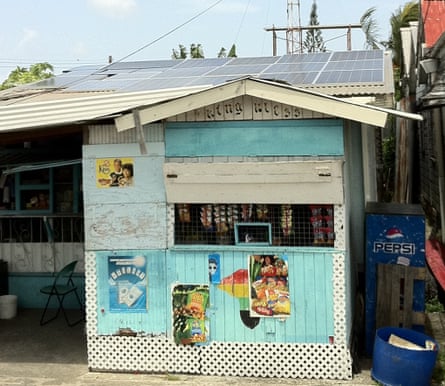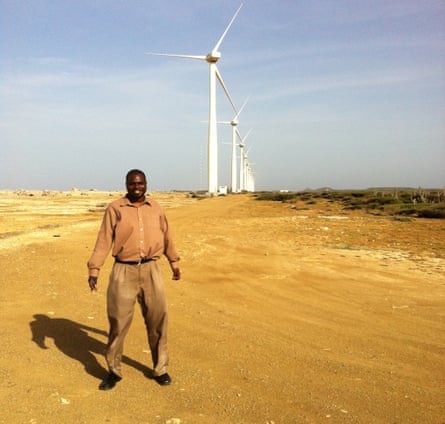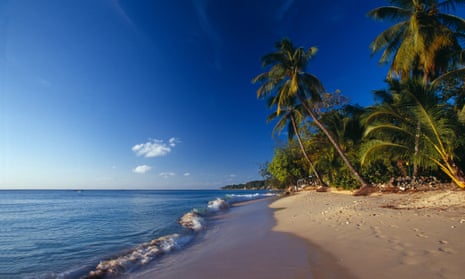Derek’s one-door shop selling cakes, sweets and soft drinks in Barbados appears at first glance to be just like any other, until you lift your eyes upward. On the roof is an array of solar panels arranged in a less-than textbook design, but the aesthetics don’t matter. What’s important is that it produces usable energy.
What motivated Derek to get into solar power? Was it a desire to be green or combat climate change? “Climate change? I don’t even know what that is,” he says. “I just didn’t want to depend on the power company.” Electricity is expensive in Barbados. Derek bought a solar kit including one panel for $100 (£64).
Derek is a mechanic by trade and is using his system to charge car batteries. He has found a way to integrate his solar system into his business. This is entrepreneurship in its truest sense. A viable business venture for Derek and a chance for wider environmental benefits for the country are the win-wins, but neither of these was the prime driver for Derek. He was essentially a tinkerer with an idea and wanted to try it out in the hope of paying less for power.

If Derek can make it to such a level of self-sufficiency starting from small beginnings, does this mean that individuals and businesses with greater means have gone even further? Well, more Dereks are gradually popping up throughout the Caribbean, but generally the answer is no.
The Caribbean appears to be the ideal location for renewable energy development. Petroleum resources are scarce and renewable resources such as solar, wind and geothermal are plentiful. Energy prices are high as there is no opportunity for economy of scale benefits that large land masses enjoy. Added to that, climate change impacts pose a major threat to the region’s small-island economies that are largely dependent on tourism and agriculture.
Despite this, most Caribbean nations still use imported diesel or oil to generate 90-100% of their energy. So what has been the barrier to using renewables? Many people have pointed to the cost factor. Small economies mean that in most cases countries have difficulty in financing renewable energy projects that require high upfront capital. Also, regulations have been slow in setting clear rules for grid interconnection. These factors have led some international investors and developers to be cautious about entering the Caribbean market.
We can learn from Derek’s example and build on local talent. Indigenous grassroots knowledge paired with the experience and access to capital of larger local and international companies would be a winning combination.
The advantage of building on local interest and indigenous talent can be seen in Jamaica. The late Raymond Wright was trained as a petroleum geologist and was head of the Petroleum Corporation of Jamaica (PCJ) in the 1970s. His interest in wind energy was piqued while searching for areas with suitable geological characteristics for petroleum development. It soon became evident that Jamaica had a significant wind resource. Over time Wright shifted the focus of his energy development to renewables and PCJ took on a leading role in the establishment of the Wigton Wind Farm, which now generates about 0.1 % of Jamaica’s energy.
Jamaica is keen to build on Wright’s legacy. Expansion of the wind farm is under way and Jamaica plans to increase renewable energy use further, with a goal to reach 20% by 2030, as part of its Vision 2030 policy. There are plans for 20 MW of PV solar to be installed to compliment the wind farm. In addition, Jamaica is offering benefits for any company or individual selling electricity to the grid from a renewable source.
Back in Derek’s home island of Barbados, there is a story of another pioneer, the late Professor Oliver Headley. An organic chemist by training, he became a leading international voice for solar energy development. He got into developing renewable energy in the 1960s after a PhD student colleague challenged him to put the sun that was beating down on them daily to productive use. His pioneering efforts helped propel Barbados to a leader in solar water heater use in the western hemisphere.
There are three solar water heater companies in Barbados and more than half of households have heaters installed, which can be written off against income tax. This policy has been in place since 1974. The story goes that the then prime minister installed a solar water heater on his house and was so impressed with the results that he put the economic incentives in place.
Barbados is keen to expand the success of solar water heaters to solar photovoltaic with the introduction of the “renewable energy rider”. This allows people installing solar photovoltaics to sell their power back to the grid at 1.6 times the usual charge. As a result of this incentive, there are now more than 300 house-top PV systems in the island, and that is expanding. There is every possibility now that we will see more Dereks by 2020 and beyond, Barbados has set itself an ambitious goal of 29% of energy to be produced from renewable sources by 2029.

A few other Caribbean countries have seen success with renewable energy. The Dutch Caribbean has led the way in terms of wind energy, with Curacao, Bonaire and Aruba all having significant generation capacity. The political connection to the Netherlands has helped with technical expertise and there has been economic support from the Dutch government. Jamaica has been able to build on the know-how of Dutch Caribbean countries in their own wind development.
Nevis, St Lucia and Dominica have all sought to develop geothermal energy projects, which is another source of renewable energy that has potential in the Caribbean. The Organisation of American States and the World Bank have provided capacity and financing support.
It is encouraging to see developments such as these. The groundwork has been laid through efforts of pioneers such as Wright and Headley and there are more grassroots leaders like Derek emerging.
But the efforts of individual champions cannot be successful without policies, legislation and economic incentives, which governments are slowly but surely putting in place. Having these policies on the books without recognising and supporting local businesses or providing an environment through which champions can come to the fore is likely to impede the progress of this spectacularly beautiful but vulnerable region in developing a flourishing green economy.
Some names have been changed.
Join our community of development professionals and humanitarians. Follow@GuardianGDP on Twitter. Join the conversation with the hashtag #EnergyAccess.

Comments (…)
Sign in or create your Guardian account to join the discussion